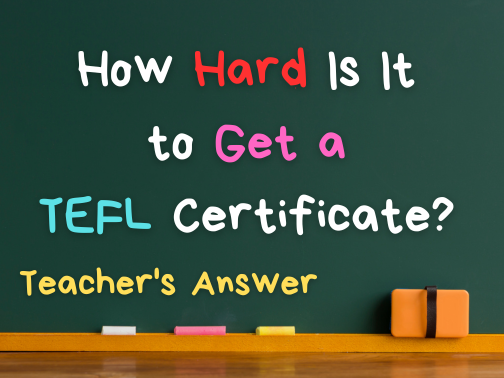Contents
Toggle
Meet David De’ Ath, founder, editor, and writer at Wonderful World English. With his extensive background as an English teacher, David provides valuable insights and practical tips on ESL for students and teachers alike.
Obtaining a TEFL (Teaching English as a Foreign Language) certificate is an essential qualification for anyone wanting to teach English as a Second Language (ESL).
A TEFL can open numerous doors to teaching English to foreign learners abroad and online.
So, just how hard is it to get a TEFL?
TEFL certificates are regarded as one of the easiest to obtain in the world of teaching ESL.
Many wonder about the difficulty level involved in obtaining a TEFL certificate. It’s relatively straightforward to receive a TEFL, but it will require a level of commitment that can be difficult for those with busy schedules. Choosing a reputable course provider is also essential to ensure the best results.
I have been teaching ESL for several years, and before I left the U.K. and came to China, obtaining a TEFL was one of the first things I needed to do.
In this article, we will explore the factors that affect the difficulty of obtaining a TEFL, along with tips on how to make the process easier.
We will also examine why having a TEFL is important in starting a career in ESL.
Let’s jump in!

How Hard Is It to Get a TEFL Certificate?
In a nutshell, a TEFL certificate is a qualification that shows an individual possesses the basic understanding to teach English to non-natives effectively.
TEFL courses provide training in several key areas of teaching ESL, such as lesson planning, classroom management, language assessment, and teaching methods.
A TEFL certificate is widely recognized and often required as a minimum requirement by employers when recruiting new teachers.
Teaching ESL can be a very rewarding career choice, and a TEFL essentially serves as a testament to a person’s competency in this growing field.
While the journey toward obtaining a TEFL certificate requires dedication and effort, it is not as difficult to obtain as other qualifications in ESL.
If you’re considering a career in ESL, you must surely have many questions you want answered.
Well, you’re in the right place!
Check out the article below to learn why a career in ESL could be the perfect fit for you.
Related Article: Why Become an ESL Teacher? – Teacher’s Top Reasons

1. Benefits of Getting a TEFL
Now we understand exactly what a TEFL certificate is, let’s look at the three major benefits that come with obtaining one:
– Better Employment Opportunities
Arguably, the best thing about obtaining a TEFL is the increased employment opportunities that it can offer.
Many schools, universities, and language schools would prefer to hire ESL teachers with a TEFL.
A TEFL certificate would set you apart from other candidates and increase your chances of securing a teaching position.
It’s worth highlighting that a TEFL is seen as a benchmark in ESL, and other qualifications are held in higher regard.
These can range from having a degree in education to a CELTA (Certificate in English Language Teaching to Adults).
Learn all about the differences between these two qualifications in the guide below.
Related Article: What’s the Difference Between CELTA and TEFL? – The Guide

– Professional Development
Another massive plus for obtaining a TEFL is that it equips any aspiring teacher with the necessary skills and understanding to navigate a classroom effectively.
TEFL courses focus on various aspects of teaching, including lesson planning, creating engaging activities, and managing diverse student requirements.
By working to obtain a TEFL, it can significantly enhance your teaching abilities and confidence in the classroom, which is crucial when first starting to teach.
– Improves Teaching Skills
The third great aspect of obtaining a TEFL is how it can help teachers improve.
Some TEFL courses allow teachers to get first-hand classroom experience and will offer feedback.
This means learners are given opportunities to apply theoretical knowledge in a classroom setting.
This practical component is invaluable in building teaching ability.
Other TEFL courses don’t have this option but will still help learners to improve their teaching skills.
If you want to know what it takes to be a good ESL teacher, click the link below!
Related Article: How to Be a Good ESL Teacher – Teacher’s Guide

2. Factors Affecting the Difficulty of Obtaining a TEFL
The difficulty level in obtaining a TEFL will vary from person to person.
There are several key factors to understand that can affect the difficulty of getting one and help people better prepare for what is required:
– Time Commitment
First and foremost, obtaining a TEFL will require a time commitment.
TEFL courses can range in length, typically between 120 to 150 hours.
This means busy individuals may have to work for a few weeks or months before obtaining a TEFL.
When I got mine back in 2018, I did a 150-hour online course.
Because I had much more free time then, I completed it in just a fraction of that time.
I was also rushing to get it done to teach in China.
However, in doing so, I could not retain as much of the information as someone who could spend more time absorbing the course material.
Fortunately, I could participate in a training period before starting my first teaching job.
So, if you’re looking to start a TEFL course, make sure to be able to fit it in with your schedule and not overwhelm yourself.
Balancing coursework, assignments, practical teaching experience, and other responsibilities can be challenging for those not studying online.
Especially for those that have full-time jobs or other commitments.

– Coursework and Assessments
TEFL courses will typically involve coursework and assessments that evaluate the teaching principles’ understanding and application.
Coursework may include reading assignments, written essays, lesson-planning exercises, and online quizzes.
The assessments ensure that candidates have grasped the necessary concepts and can apply them effectively in a teaching environment.
Some people struggle more with this aspect than others, and that’s fine.
It will require more time to pass, which they surely will if they remain committed.

– Practical Teaching Experience
As mentioned above, some TEFL programs require candidates to offer classroom experience and will require them to complete a certain number of hours to pass.
This may involve teaching practice sessions with real students or observing experienced teachers in action.
Acquiring practical teaching experience can be demanding, as it requires preparation, classroom management, and adapting to different learning needs.
This may be a little daunting initially, but it is an excellent opportunity to learn the ropes and build confidence.

– Language Proficiency Requirements
It’s also very important to have a good grasp of the English language.
Being proficient in the language will ensure that the teacher can effectively teach it to their students.
Some programs may require candidates to demonstrate proficiency in English, especially for non-native speakers.
Meeting these language requirements can add difficulty for some people who are not confident in their English ability.

3. Ways to Make Obtaining a TEFL Easier
We’ve covered the factors that can influence the difficulty of obtaining a TEFL, now let’s look at how we can make the process easier:
– Choose the Right TEFL Course
Selecting a reputable and well-structured TEFL course is crucial.
We suggest researching different programs and reading reviews to gauge what good courses are available.
Also, consider the course content, teaching methodology, and support provided before committing to a course.
A well-designed course with clear instructions and comprehensive resources can smooth the learning journey and minimize hassles and stress.
– Manage Your Time Effectively
Effective time management is very important when pursuing a TEFL certificate.
Learners should ensure their schedule can accommodate the time required to learn while not impacting their other commitments too heavily.
They should break down coursework into manageable tasks, set deadlines, and prioritize accordingly.
Consistency and discipline in following a study plan can help avoid any last-minute stress and ensure a steady rate of progress.
3. Make the Most of Available Resources
Many course providers will offer a wealth of resources to accompany learners.
It’s a great idea to use this to help build comprehension of the content and avoid having to retake examinations.
Resources may include textbooks, online materials, instructional videos, and forums to interact with fellow learners.
It can be very helpful to engage with the course materials, seek clarification when needed, and actively participate in online discussions.
Utilizing available resources can build comprehension and make the whole process more engaging.

4. The Importance of a TEFL in ESL
As mentioned in this article, having a TEFL is an excellent advantage for anyone already involved or seeking to become involved in a career teaching ESL.
Let’s take a closer look at three major reasons why having a TEFL can be of great importance for ESL teachers:
– Growing Demand for Qualified Teachers
English learning continues to grow in demand all over the world.
Many language schools, international schools, and online teaching platforms require teachers to hold at least TEFL to teach with them.
So, by obtaining one, people can position themselves as competent and committed educators, thus increasing their chances of being hired.
Check out the article below to determine whether getting a TEFL certificate is worth it.
Related Article: Is TEFL Worth It? The Pros and Cons of TEFL Certificates

– Competitive Advantage
Another important aspect of having a TEFL is that it sets candidates apart from those without formal training.
It demonstrates dedication to professional development and a level of readiness to meet the challenges of teaching English effectively.
With a TEFL certificate, individuals showcase their commitment to teaching and understand how to conduct ESL classes properly.
– Higher Earning Potential
Another important point is that teaching positions requiring their teachers to hold at least a TEFL often come with better wages.
Employers recognize the value of a qualified teacher and are willing to offer higher salaries or additional benefits.
In China, it is not uncommon for a school to provide free accommodation and other bonuses to their foreign ESL teachers.
And to teach in China, having at least a TEFL is a must.
If you want to know more about how having a TEFL can boost a teacher’s earnings, check out the article below!
Related Article: Do TEFL Teachers Get Paid More Than Non-TEFL Teachers?

5. How to Overcome Challenges in Obtaining a TEFL
We’ve covered many bases on TEFL certificates.
The path to obtaining a TEFL certificate may come with some obstacles, but there are ways to overcome them and succeed in getting this qualification:
– Motivation and Persistence
Staying motivated throughout the course is essential.
It can be easy to lose motivation when studying for anything, and it’s important to remember the reasons why you chose to pursue a TEFL in the first place.
Stay focused on your goals and remind yourself of the benefits of obtaining a TEFL certificate.
Stay persistent and keep pushing forward during challenging times, knowing that the effort will pay off eventually.
– Seek Support
Another great piece of advice is not to hesitate to seek support when needed.
You can engage with fellow learners in your course, online communities, and forums.
You can connect with other aspiring teachers or experienced educators and help them guide you.
Sharing experiences and seeking guidance can significantly help anyone feeling overwhelmed on their TEFL certification journey.

Conclusion
In conclusion, obtaining a TEFL can be a valuable investment for anyone aspiring to teach ESL.
It requires dedication and effort but is an achievable goal for anyone who commits themselves.
Learners should understand the factors affecting the difficulty of obtaining a TEFL to plan and prepare for their studies properly.
It’s important to remember the opportunities that can come with having a TEFL to stay motivated.
Remember, perseverance, commitment, and using available resources are all keys to overcoming challenges in attaining a TEFL certificate.
If you follow the tips in this article, you will get your TEFL in no time.
We hope this helps you better understand TEFL certificates and aids you in making a more informed decision on your journey.
Have a wonderful day!
Image Attribution: All images licensed via canva.com





